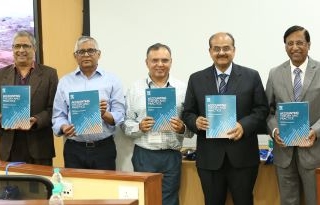
Helen Brand OBE, Chief Executive, ACCA, was recently in India. She spoke with Curriculum magazine on growing presence and acceptance of ACCA qualification in India and how accounting careers are changing and about the latest trend
Ms Brand, ACCA, has been quite active in India for past several years. What is the strategic importance of India in ACCA’s growth and plans?
India is on a high growth path and India’s decision to converge with the globally recognised accounting standards, IFRS (International Financial Reporting Standards), from April 1 has created an number of significant opportunities for ACCA (the Association of Chartered Certified Accountants).
ACCA seeks to work in partnership with colleges, universities and professional bodies to ensure that students in India are equipped to deal with IFRS or its Indian equivalent, Indian Accounting Standards (Ind AS) and will work with employers to enable more Indian accountancy professionals to be aware of its ‘Diploma in IFRS’ which gives them an understanding of the ‘new’ standards.
ACCA is working to develop the profession around the world and aims to offer business-relevant, first-choice qualifications to people of application, ability and ambition around the world who seek a rewarding career in accountancy, finance and management. To achieve this, we work with global bodies such as IFAC and with more than 80 global accountancy partnerships, including the Institute of Cost Accountants of India.
There is an increasing demand for ACCA qualified member from various employers in India, not only from the MNCs where the need for professionals, particularly with knowledge of IFRS, has been high, but also from the local employers.
There is a world of opportunity for aspiring professionals in this sector and today there are more opportunities to play a bigger role for professionals across all aspects of corporate decision making from strategy formulation to defining new business models. So, I believe ACCA will play a pivotal role in providing the right set of qualification to aspiring finance professionals in India.
Was your recent visit to India linked to that?
I was delighted to have the opportunity to visit India, to look at how ACCA is working in partnership with colleges and universities and other professional bodies to develop finance professionals for the future. I took part in a ‘Make in India’ event which explored how academia and industry must work together. I have taken part in a range of roundtables, including with the Institute of Directors to look at how board effectiveness might be enhanced and I was delighted to attend an event at which we looked at how to build resilience in corporate leaders.
People generally say that demand for financial sector jobs is still very high in comparison to supply? How is it true?
Finance professionals have a very significant role to play in the success of the economy. It’s much more than ensuring that the numbers are right, which is a critical job in itself – since a great many people rely on the accuracy of accountants and forecasts.
The growing service sector is putting more emphasis on the skills of finance professionals, who now have to deal with the vast amount of detail as well as managing very large teams and have resulted in the emergence of new career paths.
The shared services sector, which is very strong in India is enabling relatively young finance professionals to get job responsibilities that it took baby boomers in many countries, 20 years or more to learn – and earn. They are now managing accounts, processes and/or teams, replacing managers who may be as much as twice their age.
As organisational priorities shift from survival to growth, it is no surprise that even more value will be placed on finance capabilities that develop the business, virtual management skills, customer and partner-relationship expertise, ability to facilitate change and communicate, and commercial acumen.
This presents a challenge to bodies such as ACCA, which is why we regularly speak to employers to ask them what it is that they want from professional bodies and their qualifications. We also offer practical support through initiatives organised around the world, including mentoring programmes, future business leaders, events and apprenticeship.
The downturn of the economy globally in recent years must effect this argument as well?
A recent report issued by the International Federation of Accountants, the global organisation for the accountancy profession, of which ACCA is a member, showed that following the economic crisis of 2008 the number of professional accountants around the world grew at a much higher rate than in other sectors. The report shows that, even in the toughest times, finance professionals are needed to help drive recovery of the economy and ensure there is sustainable economic development. Figures showed that between 2009 and 2013, the growth in professional accountants in India was 15 percent, when the total employment growth figure was 2.9 percent.It shows that, even in the toughest times, finance professionals are needed to help drive the recovery and ensure there is sustainable economic development.
Coming to partnerships in India, can you briefly tell us, what kind of collaborations you offer to institutions of higher education and also to those people who are outside institutional framework?
The ambition of ACCA is to contribute to India’s ongoing economic success and to ensure it can take opportunities, which are being presented. We are working in partnership with a large number of leading universities, enabling students to gain our professional qualification equivalent to a UK Master’s degree at the same time as they gain a degree. At an academic level, we have quite a number of partnerships with more than 20 top Universities in India, such as Bangalore University, Loyola College for women, Christ College, Shroff College to name a few. These partnerships are very important to ACCA as we want to encourage the Indian youth to first choose Accounting and Finance as profession and then choose ACCA as a professional qualification.
Also, we have partnerships with the Confederation of Indian Industry (CII), which shows the important links between finance and industry. We have also signed an agreement withthe Institute of Cost Accountants of India (ICAI), which will set us working together in a number of ways to help develop the profession here.
Finally, what plans you are holding for India?
In recent years, India has produced highly-efficient finance professionals through various colleges and training centres.
One of the areas in which we are focussing in India is educating young people and their key careers advisers, including parents, about the availability of opportunities. We are working to increase the interaction between education and the business community and consult with employers to ensure that qualifications can open more job opportunities.There is an increasing demand for ACCA- qualified members from employers in India, not only from the multinational companies but also from local employers. As a part of the public value agenda, we are enhancing university syllabi with faculty development programmes too.









